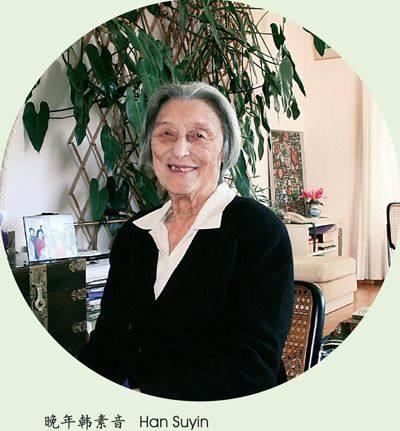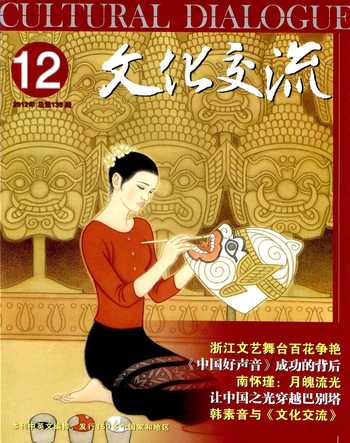韩素音与《文化交流》
魏大锅



在世界文坛上颇有影响的华裔作家韩素音于当地时间2012年11月2日中午在瑞士洛桑的寓所无疾而终,享年96岁。《文化交流》杂志社的同仁听到这一消息,无不沉浸在痛悼与思念之中。韩素音与《文化交流》曾经有过令人难忘的交往。
韩素音与中国有不解之缘。她1917年生于中国河南信阳,父亲是一位早年留学西方的中国工程师,母亲是比利时人。她的中文名字叫周光瑚,英文名字是Rosalie Elisabeth Kuanghu Chow(罗莎莉·伊丽莎白·光瑚·周)。她后来成为英国公民,改名伊丽莎白·库默。
韩素音以小说一举成名。她的长篇小说《A Many-Splendoured Thing》于1952年出版,1955年被好莱坞改编拍摄成电影《生死恋》,1956年即获得最佳服装、最佳音乐和最佳电影插曲三项奥斯卡大奖。这本书有好几个中译本,书名作《瑰宝》或《繁花似锦》或《爱情至上》。她的其他作品亦有不少在上世纪80年代被翻译成中文。
新中国成立以来,韩素音是一个家喻户晓的名字。自1956年后,她几乎每年访问中国。1974年,美中人民友好协会在美国洛杉矶召开成立大会,她做了主题发言。有关她来中国访问的报道、她与中国领导人在一起的照片经常出现在中国官方报纸上。令她著名的另一个原因,则是她和周恩来总理之间的深厚友谊。她写过《周恩来传》,曾担任过周总理与法国总统戴高乐之间“特使”。她著作颇丰,写作内容基本上都是关于中国的过去、今天和未来。在特定的年代中,韩素音以英文写就的作品就像一个个出口,为全世界了解中国提供了可能。她的笔名是韩素音,体现了她的中国心。
在当下的中国,听说过韩素音这个名字最多的,无疑是有志于翻译的青年。《中国翻译》杂志从1986年开始举办青年“有奖翻译”活动。1989年韩素音访华,提供了一笔赞助基金,以此设立了“韩素音青年翻译奖”。至2012年,“韩素音青年翻译奖竞赛”已经举办了24届,是目前中国翻译界组织时间最长、规模最大、影响最深远的翻译大赛。韩素音之所以赞助翻译竞赛,部分原因是因为她认为,中国文学要走向世界的障碍之一是外国人不懂中文,而这个世界上懂中文的外国翻译不多。解决语言障碍的方法之一是中国作家用英语写作。
韩素音与浙江,与《文化交流》颇有渊源。1992年,韩素音应邀来杭州大学讲学,并在该校设立了外国文学奖学金。在杭州期间,她与浙江省领导和杭大师生建立了友谊。此后,《文化交流》的副总编辑金雨困专门去北京看望、采访过韩素音。她非常关心《文化交流》,还经常写信来表示关注。
韩素音在1997年8月份收到《文化交流》当年第3期后,写来一份热情洋溢的信。这封信刊登在1997年第4期《文化交流》上。原信翻译如下:
王家扬社长先生,吴尧民主编先生
特以此信向你们祝贺《文化交流》1997年第3期的出版。许多年来,我一直是《文化交流》中英文双语杂志的读者。我发现1997年第3期非常出色。照片相当好。自从两年前有人参与英文编辑,贵刊的英文质量也已经大大提高。
我非常高兴地看到我有幸认识并极其尊敬的两个人的照片,这两个人就是钱学森先生和周培源先生。读到有关他们的文章,非常令人振奋。我认识他们已经有很多年。
请向贵刊才华横溢的摄影家们转达我的祝贺。我尤其喜欢第17页上徐利明所拍摄的照片,刊中彩页上的沈学溪、邵大浪、张伦以及其他各位的照片也同样出色。郁风画的山水风景也令人赞叹。
在此提一个建议:如果可能的话,请告知《文化交流》半年和一年的定价。我想多买一些贵刊寄给我在欧洲和美国的朋友。请在百忙中告诉我。
再次致以热烈的祝贺。
韩素音
1997年8月17日于瑞士洛桑蒙台大街37号
1998年5月,《文化交流》委托新华社记者邱健在韩素音来华访问时进行采访。1999年,韩素音来华访问,邱健以《文化交流》特约记者的身份在北京饭店与她交谈了三个小时。根据采访内容,邱健撰写了题目为《我唯一的爱就是中国》的报道,发表在《文化交流》1999年第4期。在长达5000字的文章中,邱健特别提到了韩素音的人格魅力。她写道,“她的幽默、机敏、博学和独立不羁的个性给我留下了深刻印象。”邱健在文章中除了讲述韩素音女士颇有传奇色彩的生平和文学成就之外,还着重从“兼通中西文化”“中国之恋”和“富有权威的中国通”三个方面来描述韩素音女士与中国结下的不解之缘。这是《文化交流》第一次全面报道韩素音女士。
2003年夏天,浙江大学教授朱炯强应邀在瑞士的伯尔尼大学做短期讲学。8月2日,朱教授和助手姜希颖前往瑞士洛桑专程拜访韩素音。朱教授专门向韩女士转达了多位老朋友的问候:浙江省原省长、浙江省对外友好协会会长、《文化交流》名誉社长沈祖伦,浙大原党委书记、《文化交流》特约顾问张浚生,杭大原党委书记薛艳庄教授,杭大原校长沈善虹教授,《文化交流》原总编辑吴尧民、时任总编辑傅通先等人。朱教授还向韩素音送上这些老朋友的小礼物:纪念邮票册及杭州丝绸围巾、西湖龙井茶叶、王星记扇子等。韩素音说,她在很多国家都有朋友,但她的心始终在中国,就像她父亲那样。
8月4日,朱教授和同事再度拜访了韩素音。她领着客人参观了她的家。她说她对日内瓦湖的风景和阳光情有独钟。当时她提到她出版的所有书和信都保存在美国波士顿大学。她还说年轻人要走向世界长见识,提到文化交流的重要性,提到通过交流增进人民之间的相互了解,开拓眼界。在访问结束时,她让姜希颖笔录了一封信,感谢来自浙江的朋友们的问候和礼物。
朱教授回国之后,特地为《文化交流》撰写了一篇文章,讲述了他和助手两次专程去日内瓦拜访韩素音。朱教授在文章中谈到了韩素音的近况;谈到了浙江老朋友送的礼物,让她爱不释手;谈到了精美邮集封面上有周恩来总理的照片,让她思绪万千,她喃喃自语说:“总理是好人呀!我和他是很好的朋友。”在这次访问中,朱教授和姜希颖还拍摄了不少照片,留下了韩素音晚年时期的珍贵形象。这篇文章和部分照片发表在《文化交流》2003年第6期上,让读者看到了韩素音一颗炽热的中国心。
《文化交流》从季刊到双月刊,再到如今的月刊,至今已走过近30年历程。韩素音见证了《文化交流》的发展,而她本人也成为《文化交流》的知音。我们发表此文缅怀她,缅怀她的中国情怀,缅怀她的文学成就,缅怀她对《文化交流》的关心和关注。她的一生,正如她最著名的小说题目:繁花似锦。
(本文照片由作者提供)
Han Suyin and
Cultural Dialogue
By Wei Daguo
Chinese-British writer and physician Elizabeth Comber, whose pen name was Han Suyin, died at the age of 95 on Friday at her home in Lausanne, Switzerland. She was born Rosalie Elisabeth Kuanghu Chow or 周光瑚 in Chinese. We at Cultural Dialogue in Hangzhou, the capital of eastern Chinas Zhejiang Province, were deeply saddened to hear about her death. Han Suyin was engaged with Cultural Dialogue in her lifetime.
For a long time in the 20th century, Han Suyin was a household name in China. She visited China almost annually from 1956 on and she was one of the few westerners who visited China after the founding of the Peoples Republic in 1949. In 1974, she spoke as a featured speaker at the founding conference of US-Sina Peoples Friendship Association in San Francisco. Official newspapers in China in those years often featured reports of her visits to China and photos in which she posed with Chinese leaders. She was well known in China also because her friendship with Premier Zhou Enlai. She wrote a biography of the premier and she served as a special messenger between Premier Zhou Enlai and French President De Gaulle. In China, the writers pen name was best known whereas her passport name Elisabeth Comber was little known, as her works are largely concerned with her roots in China.
Since the reform started in the late 1970s, Han Suyin has been a name well known among young translators in particular. China Translation, a national monthly, started an annual translation competition in 1986 for young translators. In 1989, Han Suyin provided a fund and the competition was renamed after her. Up to 2012, Han Suyin Translation Competition for Young Translators has been held 24 times. It is the most important, most influential and longest translation competition ever held in China. Han Suyin supported the translation prize primarily because she believed, based on her own experience, that one effective way to break the language barrier for Chinese writers was to write in English directly.
Han Suyin and Cultural Dialogue, now a monthly distributed to readers at home and abroad, shared a long time together. In 1992, Han was invited to give lectures at Hangzhou University, which merged with Zhejiang University in September 19998, and established a foreign literature scholarship. During her stay in Hangzhou, she formed friendship with provincial leadership and staff and students of the university and she became a reader of Cultural Dialogue, which was a quarterly back then. Jin Yukun, our deputy editor-in-chief, took a train trip to visit Han Suyin during her visit to Beijing one of these years in the 1990s.
In August 1997, she wrote a letter in English to Cultural Dialogue to express her appreciation of the magazine and her congratulations on the publishing of the third issue that year.
In 1999, Qiu Jian, our special reporter in Beijing, interviewed Han Suyin at Beijing Hotel during her visit to the capital. Qiu Jians story appeared in the fourth issue of Cultural Dialogue in 1999. In the 5,000-characger story, Qiu said she was deeply impressed by Han Suyins charming personality. The story covered Han Suyins life and career. In particular, Qiu Jian wrote about Han Suyins ties with China in three major aspects.
In the summer of 2003, Professor Zhu Jiongqiang of Zhejiang University and his assistant Jiang Xiyin were invited to be guest scholars at Berne University. On August 2, the two came to Geneva to visit 86-year-old Han Suyin at her home. Professor Zhu conveyed the warm greetings to Han Suyin from her friends in Zhejiang: Shen Zulun, former provincial governor, president of Zhejiang Peoples Association for Friendship with Foreign Countries and honorary director of Cultural Dialogue, Professor Xue Yanzhuang, retired CPC Hangzhou University Secretary, Professor Shen Shanhong, former president of Hangzhou University, Zhang Junsheng, CPC Secretary of Zhejiang University and special advisor of Cultural Dialogue, former editor-in-chief of Cultural Dialogue Wu Yaomin and incumbent editor-in-chief of Cultural Dialogue Fu Tongxian. Professor Zhu also presented the gifts from the old friends: a stamp album, ginseng, silk scarves, Dragon Well tea, and sandal fans.
Professor Zhu and his assistant Jiang Xiyin came to visit Han again on August 4. She showed them through the house and said she loved the scenery and sunshine of Geneva. They chatted. She said her published books and letters were in the keep of Boston University. Then she mentioned that Chinese young people should see more of the world for a comprehensive worldview. She talked about the importance of cultural exchanges. Zhu and Jiang took some very valuable photographs of Han Suyin. When the professor came back to Hangzhou, he wrote a complete account of his visit to Han Suyin. His story appeared in the 6th issue of Cultural Dialogue in 2003. Cultural Dialogue at that time published six issues a year. This story enabled our readers to see how Han Suyin lived in her evening years.
Cultural Dialogue has been around for nearly 30 years, growing from a quarterly to bimonthly and now a monthly. An important witness to the growth of Cultural Dialogue, Han Suyin herself has become an important chapter of our publication. We appreciate her ties with China, her literary achievement, her concern and care for Cultural Dialogue. Her life was a many-splendored thing, as suggested by the title of her best known novel published in 1952.

